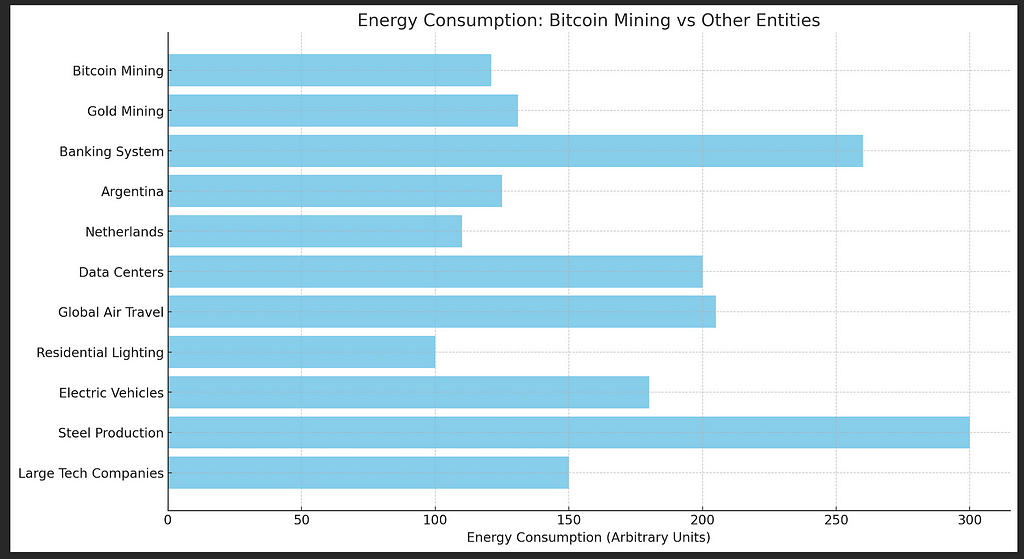In the dynamic landscape of modern finance, Bitcoin emerges not only as a groundbreaking digital asset but also as a subject of intense debate regarding its energy consumption. Often juxtaposed with various high-consumption entities, Bitcoin’s energy usage is a hot topic, stirring discussions that weigh its technological merits against environmental concerns. This article delves deep into Bitcoin’s energy consumption, comparing it with other entities, and explores the intrinsic link between its energy use and the security it offers.
Bitcoin’s Energy Consumption in Perspective
At the heart of Bitcoin’s design is the mining process, a critical component that ensures the integrity and security of transactions. This process is energy-intensive by necessity. To understand why let’s first compare Bitcoin’s energy usage with other major entities:
- Gold Mining: The traditional store of value, gold, requires extensive energy for extraction and refining. While Bitcoin’s energy consumption is often compared to gold mining, it’s crucial to consider the environmental impact and resource depletion associated with physical mining operations.
- Banking System: The global banking system, encompassing a network of physical infrastructure and digital operations, is a significant energy consumer. When compared, Bitcoin operates with considerably less physical infrastructure.
- National Energy Consumption: Compared to countries like Argentina and the Netherlands, Bitcoin’s energy usage is often similar or less, yet it serves a global user base, transcending national boundaries.
- Other High-Energy Entities: Industries like steel production, global air travel, and large tech companies consume substantial energy amounts. Bitcoin, in this context, is one of many significant energy users in the global economy.
The Link Between Energy and Security
The more energy Bitcoin uses, the more secure it becomes. This counterintuitive concept is central to Bitcoin’s blockchain technology. The Proof-of-Work (PoW) protocol, which underpins Bitcoin, requires miners to solve complex mathematical puzzles. This process, known as mining, validates transactions and secures the network. The immense energy requirement makes it prohibitively expensive and technically challenging for any malicious actor to alter the blockchain, thereby fortifying Bitcoin’s security.
Understanding the Tradeoff
Critics often highlight the environmental impact of Bitcoin’s energy consumption. However, it’s crucial to understand the tradeoffs. The energy used in mining is not just for creating new bitcoins but for maintaining a decentralized, secure, and transparent financial system. Unlike traditional banking systems, which have shown vulnerabilities and inefficiencies, Bitcoin offers a more resilient and inclusive alternative.
Comparatively, the conventional banking system, though more energy-intensive, has not provided the level of security and accessibility that Bitcoin offers. With its decentralized nature, Bitcoin eliminates the need for intermediaries, reduces transaction costs, and offers financial services to the unbanked population.
A Worthy Investment for the Future?
Given Bitcoin’s potential to revolutionize financial systems, its energy consumption can be seen as an investment in building the most secure digital asset ever known. While concerns about its environmental impact are valid, it’s essential to balance them against the inefficiencies and failures of traditional financial systems.
Furthermore, the Bitcoin community is increasingly turning towards renewable energy sources for mining operations. This shift not only alleviates environmental concerns but also paves the way for more sustainable financial technologies.
Bitcoin’s energy consumption, when placed in the context of its security benefits and compared to other major entities, presents a nuanced picture. It’s a tradeoff between energy usage and creating a secure, decentralized financial system. As we navigate the complexities of modern finance and technology, understanding this tradeoff is crucial. Bitcoin, with its multifaceted uses and potential to provide a secure alternative to traditional banking, argues for its energy consumption being a worthwhile investment in the future of finance.
The Energy Equation of Bitcoin: A Worthwhile Tradeoff for Unparalleled Security was originally published in The Dark Side on Medium, where people are continuing the conversation by highlighting and responding to this story.
